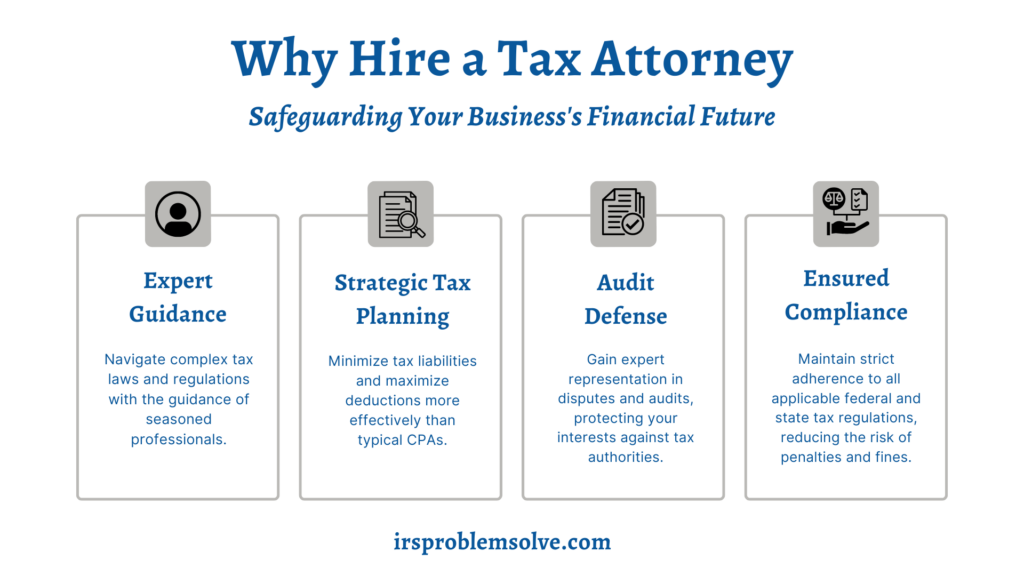
Legal Advice for Criminal Tax Matters
Legal representation in criminal tax matters is decisive due to the complex nature of tax laws and the severe consequences of criminal tax charges, including imprisonment, substantial fines, and reputational damage.
A criminal tax attorney defends clients against allegations such as tax evasion, tax fraud, failure to file returns, and improper deductions. These attorneys are not just skilled but experts in tax law and the legal system, offering a tough defense to mitigate or dismiss charges.
The IRS Criminal Investigation Division (CID) plays a key role in these cases by investigating potential criminal activities and gathering evidence for prosecution, making it indispensable to have a knowledgeable attorney to challenge the CID’s findings and protect the client’s rights.
Why You Need a Criminal Tax Attorney
Criminal tax charges include tax evasion, fraud, failure to file tax returns, and claiming improper deductions.
Tax evasion involves deliberately underreporting income or inflating deductions to reduce tax liability, while tax fraud involves falsifying tax return information. Failure to file entails not submitting required tax returns, and improper deductions involve claiming illegitimate or inflated expenses.
The CID plays a role in these cases by systematically investigating suspected criminal activities, gathering evidence, and working to prosecute individuals or entities that intentionally violate tax laws. The CID’s involvement highlights the seriousness of these charges and the urgent need for expert legal representation.
 Tax Crimes and Defenses
Tax Crimes and Defenses
Defending against tax evasion and fraud charges requires strategic approaches to challenge the allegations. Effective defense involves scrutinizing evidence, proving the legitimacy of tax filings, and addressing compliance issues. For unfiled returns, the focus is on mitigating penalties and demonstrating corrective actions, while defending against improper deductions and employment tax fraud requires thorough analysis and justification of financial records.
Key Defense Strategies
- Tax Evasion: Demonstrate that any discrepancies in the tax filings were unintentional and provide thorough and accurate financial documentation to support this claim.
- Tax Fraud: Conduct an accurate examination of the evidence presented by the prosecution and argue for the legitimacy and accuracy of the tax filings.
- Unfiled Returns: Focus on reducing penalties by proactively complying with tax obligations, such as filing delinquent returns and rectifying past mistakes.
- Improper Deductions and Employment Tax Fraud: Perform a comprehensive analysis of financial records to justify the claimed deductions and address any misreporting or inaccuracies, ensuring that all deductions are legitimate and properly documented.
How Attorneys Help
The legal process in criminal tax cases starts with an initial investigation by the IRS Criminal Investigation Division (CID), which gathers evidence for prosecution. Steering this phase, especially during sensitive eggshell audits and parallel proceedings, requires careful handling to avoid further criminal scrutiny. Building a defense involves collecting ample evidence, disputing the prosecution’s claims, and presenting a strong case in court.
Experienced legal representation is invaluable; seasoned attorneys with tax law and criminal defense expertise can significantly impact the outcome. Case studies show that such attorneys can successfully negotiate settlements and plea deals, often reducing or dismissing charges.
Consequences of a Criminal Tax Conviction
Criminal tax convictions carry severe legal penalties, including imprisonment, substantial fines, and restitution orders to repay owed taxes. Financial implications can be devastating, often resulting in the loss of assets and heightened scrutiny of future financial activities by authorities.
Personal and professional consequences are equally significant; individuals may suffer reputational damage that affects their standing in the community and professional circles, potentially leading to the loss of professional licenses and certifications, thereby hindering future career opportunities.
Steps to Take If You Are Under Investigation
Have you recently realized that you are under investigation and unsure what to do next? It’s completely normal to feel anxious and stressed in such a situation. Tax laws can indeed be confusing and overwhelming.
To help guide you toward a favorable resolution, here are some steps to take:
- Recognize the Signs: Look for unexpected contact from IRS CID agents, formal notices, or inquiries about your financial activities.
- Avoid Direct Engagement: Politely decline to answer questions from CID agents until you have legal representation.
- Secure Documentation: Gather and protect all relevant financial records and tax returns without altering or destroying any documents.
- Limit Discussions: Refrain from discussing your case with anyone other than your attorney to prevent self-incrimination.
- Choose the Right Attorney: Find a criminal tax attorney with specialization, strong credentials, a successful track record, and good communication skills.
- Leverage Legal Expertise: Confirm your attorney can access a network of tax and accounting experts to support your defense.
Need Legal Help?
To avoid criminal charges, it’s essential to adhere to best practices for tax compliance, such as maintaining accurate financial records, filing tax returns on time, and following all tax laws and regulations. Regular audits and professional tax advice are crucial in identifying and correcting potential issues before they escalate. Additionally, voluntary disclosure programs offer an opportunity for taxpayers to come forward and correct their filings, reducing the risk of criminal prosecution.
At Todd S. Unger, Esq., LLC, we understand the importance of proactive measures and expert legal guidance. If you are facing tax-related legal issues, seeking experienced legal help is imperative to protect your rights and achieve the best possible outcome. Call now! (877) 544-4743



